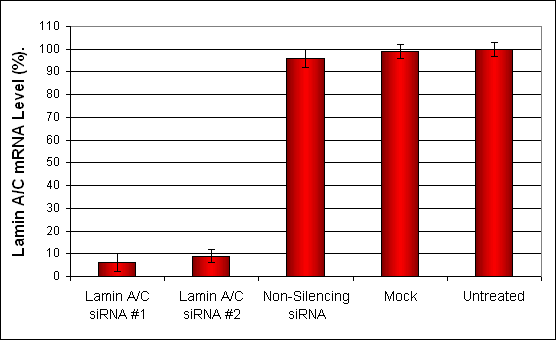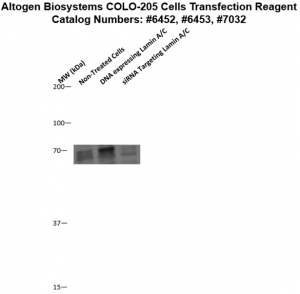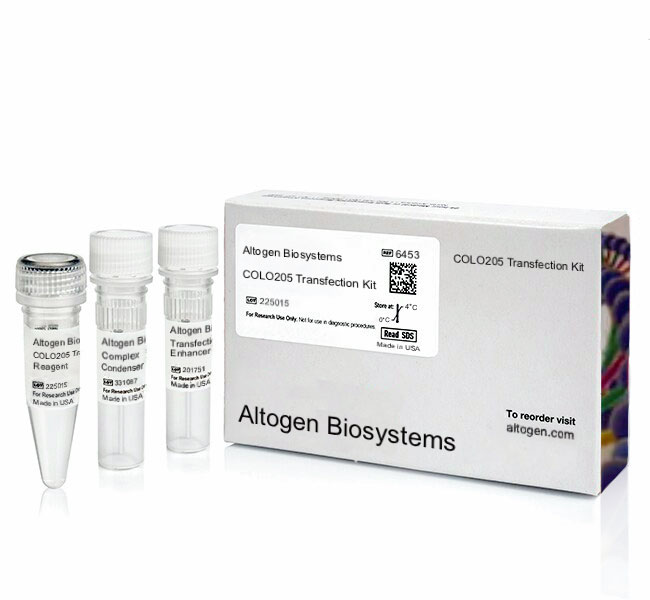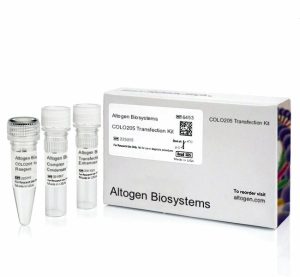Description
Purchase Orders: Click “Add to Cart” button to order, then email PO to orders@altogen.com.
Product Availability: In Stock.
Transfection Reagent for COLO-205 Cells (Colon Adenocarcinoma Cell, CCL-222)
-
A nanoparticle-based liposome formulation
-
Transfection protocols provided for transfection of proteins, DNA, mRNA, siRNA, shRNA and microRNA
-
Produce higher level of recombinant protein expression with minimal disruption of normal cell function
-
Generate physiologically relevant data you can trust
-
Effective for plasmid DNA/siRNA co-transfection
-
Easy-to-use transfection protocol with reproducible results
-
Low cytotoxicity
-
Download in vitro COLO205 transfection protocol: [PDF]
- Download COLO205 CRISPR/Cas9 transfection protocol: [PDF]
-
Download PowerPoint presentation for COLO-205 cells transfection kit: [PPT]
- UPC/GTIN/EAN: 860002089741
-
Brand: ALTOGEN®, developed and manufactured by Altogen Biosystems
Transfection Efficiency:
Reagent exhibits at least 91% transfection efficiency of siRNA delivery. Transfection efficiency was determined by qRT-PCR.
Product Description:
Optimized transfection reagent for COLO205 cells high transfection efficiency and low cytotoxicity. Transfection kit for human colon adenocarcinoma cell line.
Transfection Protocol and SDS:
Download Altogen Biosystems COLO-205 Transfection Protocol: [PDF]
Download SDS: [PDF]
COLO-205 Cell Line:
Colon cancer is the third most prevalent cancer globally and the second primary cause of cancer-related deaths that is reportedly responsible for more than 50,000 fatalities every year in the United States alone. The lifetime risk of developing colon cancer is slightly lower in women than in men, as stated by the American Cancer Society (ACS). The COLO-205 cell line was established in 1975 from a 70-year-old Caucasian male patient with colon cancer. These cells exhibit epithelial cell morphology and come from a Dukes’ type D tumor. The patient had been treated with 5-fluorouracil for approximately five weeks before removal of the specimen. Also, the cells have been tested negative for CSAp, positive for keratin, and express a 36,000-dalton cell surface glycoprotein, which has a related antigen. The COLO-205 cell line is similar to COLO 201 and was derived from the same patient. In addition to being an adequate host for studying colon cancer, this cell line is utilized for researching the SV-40 monkey virus. Moreover, in biochemistry, the COLO-205 cell line is used for transfection and has applications for the production of recombinant proteins. Altogen Biosystems provides transfection reagent kits for the COLO-205 colon cancer cell line. The nanoparticle-based reagents have demonstrated high efficiency and low cytotoxicity.
Colo205 is a human colon adenocarcinoma cell line that was established from a metastatic site of colon cancer. This cell line is widely used in cancer research to investigate the biology and treatment of colon cancer. The Colo205 cell line has been characterized as having a high degree of chromosomal instability, which is a hallmark of many cancer cells. Researchers use this cell line to study the molecular mechanisms underlying the development and progression of colon cancer, as well as to test the effects of potential therapeutics on cancer cells. Colo205 cell line is a valuable tool for cancer researchers and has contributed to many advances in our understanding of the biology and treatment of colon cancer. However, it is important to note that cell lines may not fully recapitulate the complexity of primary tumors, and results obtained from cell line studies should be validated in animal models and patient samples.
Mutations:
| BRAF | 673 | 37 | 7 | 140453136 | 140453136 | Missense_Mutation | SNP | A | T |
| CDH8 | 1006 | 37 | 16 | 62055071 | 62055071 | Silent | SNP | C | T |
| ZNF480 | 147657 | 37 | 19 | 52825759 | 52825759 | Missense_Mutation | SNP | G | T |
| MPDZ | 8777 | 37 | 9 | 13119542 | 13119542 | Missense_Mutation | SNP | C | T |
| GJA9 | 81025 | 37 | 1 | 39340690 | 39340690 | Nonsense_Mutation | SNP | C | A |
| NSG2 | 0 | 37 | 5 | 173534384 | 173534384 | Missense_Mutation | SNP | G | A |
| ASTN2 | 23245 | 37 | 9 | 119976858 | 119976858 | Missense_Mutation | SNP | C | T |
| PRKCZ | 5590 | 37 | 1 | 2087523 | 2087523 | Silent | SNP | G | A |
| TAS1R1 | 80835 | 37 | 1 | 6637034 | 6637034 | Missense_Mutation | SNP | G | A |
| ANGPTL7 | 10218 | 37 | 1 | 11253831 | 11253831 | Splice_Site | SNP | G | A |
| MTOR | 2475 | 37 | 1 | 11270947 | 11270947 | Missense_Mutation | SNP | G | A |
| PTCHD2 | 57540 | 37 | 1 | 11562879 | 11562879 | Missense_Mutation | SNP | G | A |
| LCK | 3932 | 37 | 1 | 32740628 | 32740628 | Silent | SNP | C | T |
| KANK4 | 163782 | 37 | 1 | 62734099 | 62734099 | Missense_Mutation | SNP | C | A |
| GSTM2 | 2946 | 37 | 1 | 110251189 | 110251189 | Silent | SNP | G | A |
Data:

Figure 1. siRNAs targeting Lamin A/C mRNA or non-silencing control siRNA were transfected into COLO-205 cells following the recommended protocol. At 48 hours post-transfection the cells were analyzed by qRT-PCR for Lamin A/C gene expression levels. 18S rRNA levels were used to normalize the Lamin A/C data. Values are normalized to untreated sample. Data are means ± SD (n=4).

Figure 2. Protein expression of Lamin A/C in COLO-205 cells. DNA plasmid expressing Lamin A/C or siRNA targeting Lamin A/C were transfected into COLO-205 cells following Altogen Biosystems transfection protocol. At 72 hours post-transfection the cells were analyzed by Western Blot for protein expression levels (normalized by total protein, 10 µg of total protein loaded per each well). Untreated cells used as a negative control.
Altogen Biosystems provides preoptimized transfection products for life science research applications. Transfection protocols are optimized for individual cancer cell lines. Altogen Biosystems developed two types of in vivo delivery kits for animal research: Tissue-targeted reagents (delivery to liver, pancreas, and kidney tissues), and broad range in vivo delivery reagents (PEG-Liposome, Nanoparticle-based, Lipid-based, and Polymer-based kits). Advanced formulation of reagents and optimized transfection protocols provide efficient intracellular delivery of proteins, DNA, RNA, and any other negatively charged molecules in vitro and in vivo. Read more about transfection technology at Altogen’s Transfection Resource. Altogen Labs provides good laboratory practice (GLP) compliant preclinical research services for IND applications and drug development. Our biology CRO services includes both efficacy studies (over 90 in-house validated xenograft models) and safety pharmacology/toxicology studies.
Volume Options:
- 0.5 ml (Catalog #6452)
- 1.5 ml (Catalog #6453)
- 1.5 ml CRISPR (Catalog #2132)
- 8.0 ml (Catalog #7032)
Purchase Orders: Click “Add to Cart” button to order, then email PO to orders@altogen.com.
Product Availability: In Stock.






